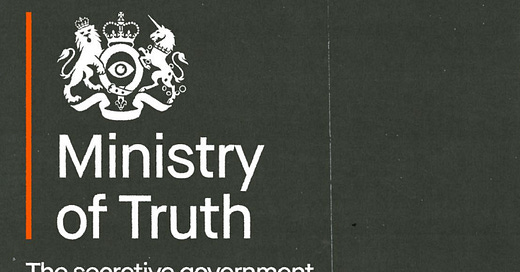An unholy alliance threatens free speech
In a guest post, Madeleine Stone of Big Brother Watch explores how government and Big Tech are tackling 'disinformation'. But who decides what 'disinformation' is?
The panic over online disinformation reached its zenith during the pandemic. Ministers, opposition politicians, even journalists, wasted no time in pushing tech companies to go harder and faster in censoring the public square. Naive members of the public, they reasoned, needed steering away from ‘inappropriate’ content in an unprecedented situation.
Any responsible government would be right to issue strong public-health messages and rebut verifiably incorrect medical advice in the midst of an unprecedented public-health threat. But looking back on the government's handling of the pandemic, many will feel there were few less qualified to decide what trustworthy information was than those in Whitehall.
The general chaos that was going on behind closed doors (as the Covid Inquiry has revealed) didn’t stop the creation of the Counter Disinformation Unit. Previously stood up in 2019 for the European Parliament election and UK general election, the unit consisted of a team of civil servants whose role was to ‘crack down’ on ‘false coronavirus information online’. Originally set up to combat deliberately misleading information and foreign-state misinformation campaigns, the Unit’s remit was widened to cover the ‘inadvertent sharing of false information’. Rather than being disbanded after the pandemic, it has become a fixture in the Department for Science, Innovation and Technology, working on the COP 26 climate talks, local elections, the Northern Irish Assembly elections, events surrounding the death of Queen Elizabeth II and the Russian invasion of Ukraine.
Despite claims that the Unit’s role was limited to understanding ‘attempts to artificially manipulate the information environment’, documents that we were able to uncover at Big Brother Watch show that general political comments and criticisms of government policy have been the subject of interest, and were compiled in ‘misinformation reports’. One report featured analysis of which people had been sharing a Daily Mail article about mandatory booster vaccines for care workers. Another logged comments made by Big Brother Watch’s director, on Talk TV, criticising vaccine passports proposals. One disinformation report even featured Green MP Caroline Lucas referring to comments she made in which she called the former prime minister, Boris Johnson, a liar. If questioning the integrity of Boris Johnson is grounds for inclusion in a ‘misinformation’ report, it is clear how loose the term has become to those inside Whitehall.
Even more worryingly is that ministers have boasted that the Unit has a hotline to social-media companies’ content moderators through the department’s ‘Trusted Flagger’ status. Trusted flaggers can skip the content-moderation queue, and their complaints are given extra weight. Ministers have claimed in response to questions from MPs and peers that the Unit doesn’t mandate the platforms to take down content. But when posts are flagged for removal by the state, it is hard to imagine that this additional pressure is not felt by platforms.
As internal emails show, social-media companies have welcomed the government's efforts to control online discourse. Not only eager to maintain cosy relationships with state actors, social-media companies welcome the consensus that their platforms wield huge amounts of power over the opinions and actions of the public. After all, this narrative is essential to their business model. By framing their users as easily swayed and manipulated by the content on their platforms, they can command huge profits from selling our data to advertisers. Amid this unaccountable relationship between civil servants, Silicon Valley employees and ministers, considerations of freedom of expression are reduced to little more than a box-ticking exercise.
To date, the government has spent many millions on contracts with companies who promise to ‘identify problematic content, actors and activity’ in cooperation with the Unit. Most prominent is Logically, an internet-monitoring firm who market themselves as using AI to locate and analyse disinformation, working with governments and social-media platforms around the world. Their employees include the UK government’s former head of counter disinformation and a US Homeland Security official who was fired for building intelligence dossiers on campaigners and journalists. They were paid huge sums of public money to scour social media, creating reports that included journalists, politicians, campaigners and members of the public.
Despite the potential the CDU has to influence public discourse and its clear impact on free speech, this shadowy body has evaded scrutiny at every turn, telling journalists that the need to ‘preserve a “safe space” around ministers and government officials’ meant that critical information about the Unit’s operations could not be disclosed. Big Brother Watch published our report, Ministry of Truth, after months of dogged research and parliamentary pressure. After the resulting backlash, the Counter Disinformation Unit has rebranded itself as the National Security Online Information Team (NSOIT). It is not clear what, if anything, has changed about the Unit’s work.
NSOIT is part of a broader picture of a government increasingly concerned with clamping down on dissent. Big Brother Watch's Ministry of Truth investigation delved into a myriad of other units, including the Cabinet Office’s Rapid Response Unit, the Home Office’s Research, Information and Communications Unit, and the Foreign Office’s Government Information Cell. Between them, these unaccountable units were tasked with cleansing - and in some cases, manipulating - online conversation. Equally as troubling is the newly passed Online Safety Act, which only embeds this new culture of censorship in the name of safety. The Act gives state backing to platforms’ terms of service, asking Big Tech platforms to introduce sweeping new measures to moderate what information we can access, scan our content and act as speech police, or else risk vast fines and their services being blocked from the country.
The public forum is messy. As society grapples with pandemics, wars, political upheaval and climate change, there will be mistakes, criticisms and heated arguments. Top-down attempts to wade into important debates and label certain views as ‘false’ will not only inevitably result in errors, but flies in the face of why free speech is protected in the first place. The European Convention on Human Rights enshrined in law the right to freedom of expression as a direct response to decades of repression from authoritarian states. It was recognised that states shouldn’t have the monopoly on truth, and that citizens must be free to disagree with each other, and their governments. The tech revolution, and the concentration of power that has ensued, is forcing us to make those arguments again.
Madeleine Stone is a senior advocacy officer at Big Brother Watch, which investigates and challenges threats to civil liberties from state and corporate overreach. To find out more, visit the Big Brother Watch website.





